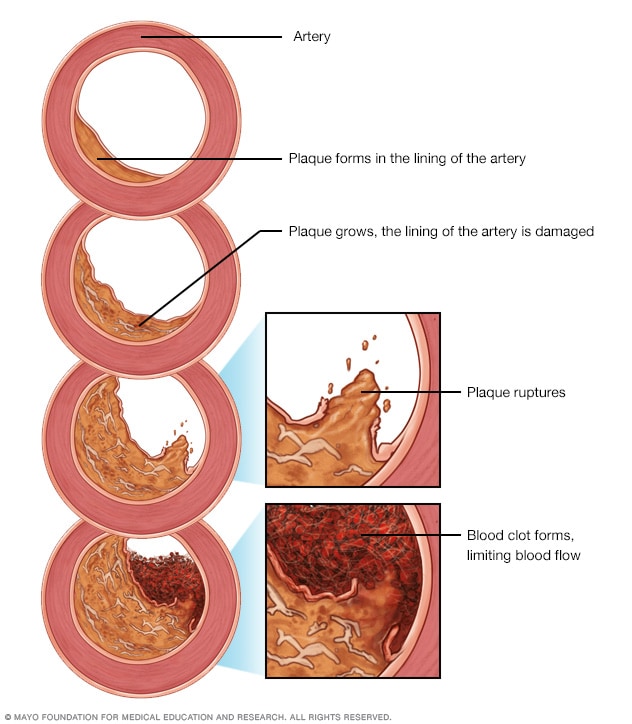Cholesterol is a waxy molecule that is found in the bloodstream. While your body needs cholesterol to create healthy cells, excessive cholesterol levels can raise your chance of developing heart disease.
With elevated cholesterol levels, fatty deposits can form in the blood arteries. Eventually, these deposits develop in size, obstructing the flow of blood via your arteries. Occasionally, such deposits rupture abruptly and form a clot, resulting in a heart attack or stroke.
Although high cholesterol can be inherited, it is frequently the consequence of poor lifestyle choices, making it avoidable and curable. A balanced diet, frequent exercise, and, in some cases, medication can all aid in the reduction of high cholesterol.
There are no symptoms associated with high cholesterol. Only a blood test can determine if you have it.
When to see a doctor
The National Heart, Lung, and Blood Institute (NHLBI) recommends that individuals have their first cholesterol screening between the ages of 9 and 11, and then every five years thereafter.
The NHLBI advises that men aged 45 to 65 and women aged 55 to 65 get cholesterol tests every one to two years. Individuals over the age of 65 should get their cholesterol levels checked yearly.
If the results of your tests fall outside of acceptable ranges, your doctor may prescribe more regular measures. Additionally, if you have a family history of high cholesterol, heart disease, or other risk factors such as diabetes or high blood pressure, your doctor may recommend more regular tests.
Causes
Cholesterol is transported through the bloodstream by proteins. Lipoproteins are a mixture of proteins and cholesterol. There are many kinds of cholesterol, depending on the cargo carried by the lipoprotein. They are as follows:
- Low-density lipoprotein (LDL). LDL, the “bad” cholesterol, transports cholesterol particles throughout your body. LDL cholesterol builds up in the walls of your arteries, making them hard and narrow.
- High-density lipoprotein (HDL). HDL, the “good” cholesterol, picks up excess cholesterol and takes it back to your liver.
Typically, a lipid profile would also include a measurement of triglycerides, a kind of fat found in the blood. A high triglyceride level can also raise your chance of developing heart disease.
Factors beyond your control, such as inactivity, obesity, and a poor diet, all contribute to high cholesterol and triglyceride levels. Additionally, factors beyond your control may be involved. For instance, your genetic composition may impair your body’s ability to eliminate LDL cholesterol from your blood or to break it down in the liver.
Several medical disorders can result in abnormal cholesterol levels, including the following:
- Chronic nephropathy
- Diabetes
- HIV/AIDS
- Hypothyroidism
- Lupus
Cholesterol levels can also be exacerbated by some drugs you may be taking for other health concerns, including the following:
- Acne\sCancer
- Hypertension
- HIV/AIDS
- Heartbeats that are out of sync
- Transplantation of organs
Risk factors
Factors that can increase your risk of unhealthy cholesterol levels include:
- Poor diet. Eating too much-saturated fat or trans fats can result in unhealthy cholesterol levels. Saturated fats are found in fatty cuts of meat and full-fat dairy products. Trans fats are often found in packaged snacks or desserts.
- Obesity. Having a body mass index (BMI) of 30 or greater puts you at risk of high cholesterol.
- Lack of exercise. Exercise helps boost your body’s HDL, the “good,” cholesterol.
- Smoking. Cigarette smoking may lower your level of HDL, the “good,” cholesterol.
- Alcohol. Drinking too much alcohol can increase your total cholesterol level.
- Age. Even young children can have unhealthy cholesterol, but it’s much more common in people over 40. As you age, your liver becomes less able to remove LDL cholesterol.
Complications
High cholesterol levels can result in a hazardous buildup of cholesterol and other fatty deposits on the inner linings of your arteries (atherosclerosis). These deposits (plaques) can impair blood flow through your arteries, resulting in a variety of problems, including the following:
- Chest pain. If the arteries that supply your heart with blood (coronary arteries) are affected, you might have chest pain (angina) and other symptoms of coronary artery disease.
- Heart attack. If plaques tear or rupture, a blood clot can form at the plaque-rupture site — blocking the flow of blood or breaking free and plugging an artery downstream. If blood flow to part of your heart stops, you’ll have a heart attack.
- Stroke. Similar to a heart attack, a stroke occurs when a blood clot blocks blood flow to part of your brain.
Prevention
The same heart-healthy lifestyle choices that help decrease cholesterol can also help prevent you from developing it in the first place. You may help avoid high cholesterol by doing the following steps:
- Eat a low-salt diet that emphasizes fruits, vegetables, and whole grains
- Limit the number of animal fats and use good fats in moderation
- Lose extra pounds and maintain a healthy weight
- Quit smoking
- Exercise on most days of the week for at least 30 minutes
- Drink alcohol in moderation, if at all
- Manage stress


